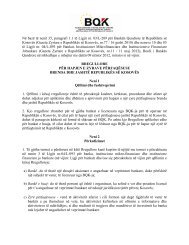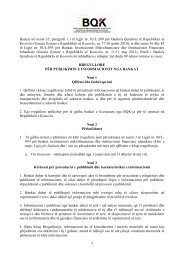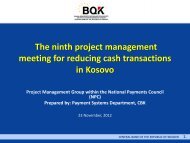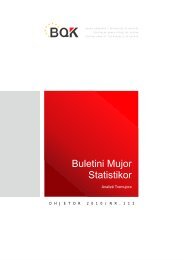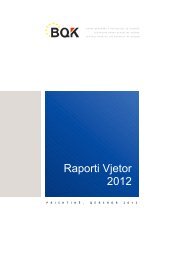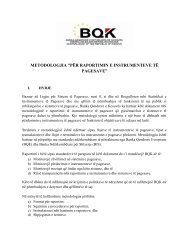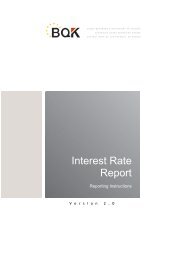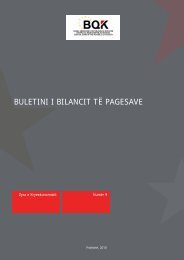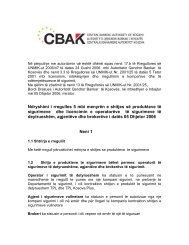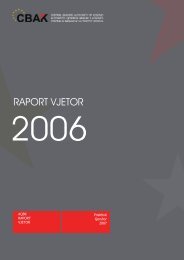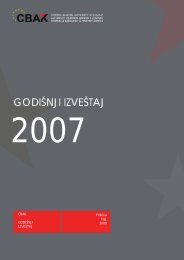Number 1<strong>Financial</strong> <strong>Stability</strong> <strong>Report</strong>is a lower perception about the presence of corruption in courts. 'Debtor obstruction' (1.75),which relates to the possibilities which exist for the debtor to prevent, slowdown orotherwise obstruct the enforcement proceedings, seems to be a moderate impediment to theenforcement process. Compared to year <strong>20</strong>05, debtor obstruction seems to be more of aproblem, mainly because debtors are increasingly causing process delays through filingunsubstantiated complaints or by influencing the process in other ways. In terms of scope ofcollateral, broad categories of assets can serve as collateral and the replacement ofcollateral or the inclusion of new collateral is possible, so the scope of collateral was scoredat 1.Score (1) was attained also for 'preferential creditors', 'credit control', and 'insolvencyranking'. For example, there are no preferential creditors that may have priority over bankclaims. This is also the case with the provisions of the bankruptcy law that give priority tosecured creditors (insolvency ranking). Then the practical experience with the cases seemsextensive and inventory quite effective as collateral. The insolvency process was not scoreddue to lack of experience with bankruptcy proceedings.Overall, the situation regarding the enforcement of creditor rights in Kosovo, in <strong>20</strong>10, maybe considered to be in a similar level with year <strong>20</strong>05. This is in line with the view thatinstitutions in general change slowly over time (Clague et al., 1997). Taking into accountthe fact that the situation with regard to the enforcement of creditor rights in Kosovo in<strong>20</strong>10 was at a similar level with year <strong>20</strong>05, and also the fact that in general institutions areconsidered to change slowly over time, we compare the survey results obtained for Kosovoin <strong>20</strong>10 with the results obtained from the EBRD’s survey for other transition economies inyear <strong>20</strong>03 despite the time distance between the two surveys (Table 19). Regarding theoverall score for NLIS <strong>20</strong>03, Kosovo’s score of 18.5 suggests that Kosovo, on average,outperforms SEE and CIS countries, while lagging behind the CEE countries. Consideringthe countries in the region, Bulgaria, Croatia and Macedonia are ahead. Regarding theprocess and scope factors, Kosovo scores 1.57, which outperforms the CIS average (2.18),the SEE average (1.94) and also the CEE average (1.68). For the process and scope factors,lower scores indicate better rating.Table 19. Enforcement of collateral laws in Kosovo, SEE, CEE and CISAmount, Time and Simplicity Process and Scope FactorsKosovo (<strong>20</strong>10) 18.5 1.57Albania 18 1.92Bosnia and Herzegovina 4 2.58Bulgaria 23 1.83Croatia 22 1.83Macedonia 21 1.58Romania 18 1.67Serbia and Montenegro 19 2.17SEE (average) 17.9 1.94CEE (average) 24.3 1.68CIS (average) 13.2 2.18Source: EBRD (<strong>20</strong>03) and own survey for Kosovo88 |
<strong>Financial</strong> <strong>Stability</strong> <strong>Report</strong>Number 1Notes: Amount, Time and Simplicity ranges from 0 to 30 and a higher score corresponds to better enforcement; Process and Scope factors take value of 1, 2and 3 when the particular factor represents a minor, moderate and major problem in the enforcement process, respectively.10.5. Voluntary compliance, bargaining, self-help and the market for collateralIn the context of the bank-client relationship, the process of dispute resolution can bethought of as a game with sequential solutions between the lender and the defaultingborrower. Each step influences the expectation of recovery on the lenders’ side. First, thedispute can be solved by voluntary compliance, i.e. without the involvement of formalinstitutions. It may be that most cases are resolved in this manner because the threat oflegal action by banks against a borrower in default may be sufficient. In this phase, a partof the debt will be recovered and it will take some time for the recovery to take place. Theevolution of voluntary compliance may be linked to various possibilities. Agents may knowex ante that the law and institutions that support that law are in place. Or, they may haveno knowledge of the law and simply abide contracts based on trust. Alternatively, agentsmay be reluctant to deal with the state’s formal institutions, care about their reputationand/or calculate costs/benefits of defaulting. On the other hand banks may prefer not to usecourts because they consider them to be slow and thus opt using other means. Hay, et al.(1996) point out that the legal system may not be used to resolve disputes because badcourts raise the cost of using legal system; court fees may be prohibitively high; judges maybe corrupt, uninformed and incompetent; courts may be unpredictable and so it may takeyears to get a dispute resolved by which time the value of the damages that may becollected falls to zero in real terms.It seems that motives for voluntary compliance of the law are diverse. If institutions makethe threat of enforcement credible, then voluntary compliance may outweigh compulsoryenforcement and reduce transaction costs. Cross (<strong>20</strong>02) notes that to the extent that theagents believe that the legal system works, the costs of enforcing rules are reducedenormously by the simple fact that the individuals will not disobey the rules or violateproperty rights, a standard assumption in legal theory. Thus looking at only the formal partof dispute resolution is only one part of the story. Formal and informal resolution shouldnot be seen as substitutes, rather they complement each other, specifically when formalresolutions are efficient, informal ones should be more pronounced. The issue of voluntarycompliance is not explored by the EBRD since the methodology was designed exclusively toexplore how legal institutions work.Second, the bargaining phase can be thought of as another step before the dispute comes toformal resolution. Again some amount will be recovered and it will take some time beforethe recovery is made. The weakest party in the bargaining phase reveals the functioning ofinstitutions, or at least the perception of how institutions function. If lenders are theweakest in this phase, i.e. ready to make concessions, then this may signal poorperformance of institutions in the dispute resolution. Again, this issue has not beenexplored by EBRD. Third, when it comes to enforcement then two possibilities exist: (i) selfhelp,i.e. the lender repossesses the collateral by court order but not involving court officials(or police), or (ii) court involvement. If a majority of disputes are solved with self-help,again that reflects not so much on the effectiveness of the law explicitly. Instead, it maysignal the credibility of institutions which would have important policy implications.Specifically, enforcement by the state would be necessary in only a few cases, especially insmall societies, to make the threat credible and thus can be quite effective by involving lowcosts.| 89



